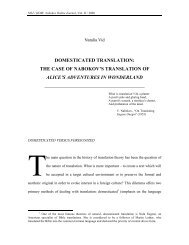Nabokov's Invitation to Plato's Beheading
Nabokov's Invitation to Plato's Beheading
Nabokov's Invitation to Plato's Beheading
- TAGS
- beheading
- etc.dal.ca
Create successful ePaper yourself
Turn your PDF publications into a flip-book with our unique Google optimized e-Paper software.
A. Moudrov. “Nabokov’s <strong>Invitation</strong> <strong>to</strong> Pla<strong>to</strong>’s <strong>Beheading</strong>”<br />
death. He declares that “any man who faces death with confidence is foolish unless he<br />
can prove that the soul is al<strong>to</strong>gether immortal” (Phaedo 88b). Considering the context of<br />
this statement (Socrates awaits his execution) the argument about immortality becomes a<br />
personal rather than a strictly philosophical endeavor. Socrates in fact admits this later<br />
on: “I am in danger at this moment of not having a philosophical attitude about this<br />
[argument].” He compares himself <strong>to</strong> those who deceive themselves and<br />
give no thought <strong>to</strong> the truth about the subject of discussion but are only<br />
eager that those present will accept the position they have set forth. I differ<br />
from them only <strong>to</strong> this extent: I shall not be eager <strong>to</strong> get the agreement of<br />
those present that what I say is true, except incidentally, but I shall be very<br />
eager that I should myself be thoroughly convinced that things are so.<br />
(Phaedo 91a, my emphasis)<br />
It is as if the circumstances oblige Socrates <strong>to</strong> construct an argument of his immortality,<br />
but no matter how elaborate his argument may seem, it does not have the power <strong>to</strong><br />
convince himself. Even more unconvinced are his interlocu<strong>to</strong>rs who sometimes appear <strong>to</strong><br />
agree with Socrates in part out of consideration for his situation (Phaedo 84c-e, among<br />
other places). The real tragedy of Socrates’ execution, which Pla<strong>to</strong> depicts with an<br />
undeniable literary skill, is that Socrates is ultimately facing death without a comfortable<br />
sense of certainty about his future. What is admirably heroic about Socrates, and what is<br />
really painful <strong>to</strong> witness as a reader of Phaedo, is that he creates a reassuring theory<br />
about afterlife and immortality while remaining strong enough not <strong>to</strong> dismiss that<br />
unsettling feeling that there is no immortality at all, resisting the natural temptation <strong>to</strong><br />
cling <strong>to</strong> a comfortable vision of afterlife in the days before his death.
















